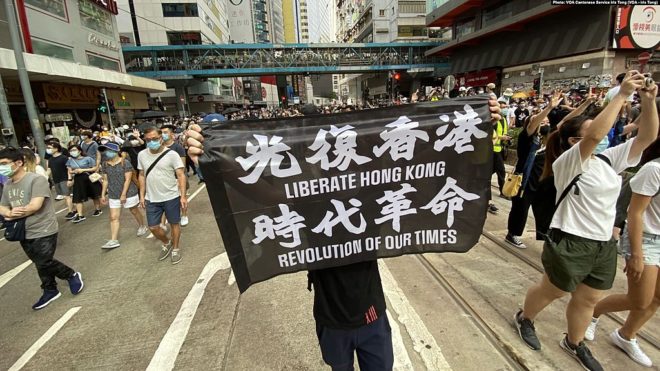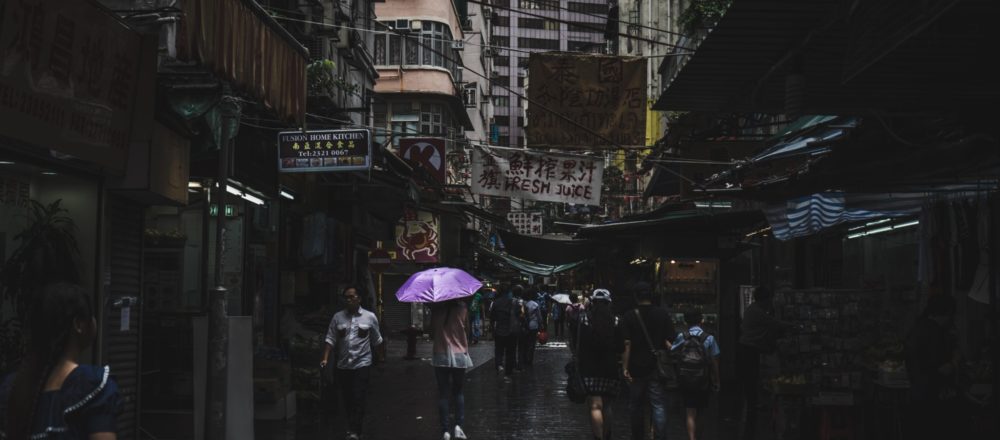On 30 June 2020, the central authorities of the People’s Republic of China imposed a Law on Safeguarding National Security on Hong Kong. The law has been rightly criticised as putting an end to Hong Kong’s status as an autonomous system based on the rule of law. The images of protesters bearing blank white sheets of paper, instead of political slogans, seemed to be the most profound symbol of the dramatic political-legal shift inaugurated by the new legislation. That is, until, as documented by Hong Kong Free Press, police began to arrest these protesters for suspected breaches of the Law, adding to an imagery of swiftly escalating repression.
The law introduces broadly defined crimes of secession (article 20), subversion (article 22), terrorist activities (article 24), and ‘collusion with a foreign country or with external elements to endanger national security’ (article 29), likely to be used to punish peaceful criticism of the government. Take, for example, the act of ‘conspiring with a foreign organisation’ to engage in ‘using various illegal methods to lead the residents of the [Hong Kong Special Administrative Region] HKSAR to hate the Central People’s Government or the Government of the HKSAR, where serious consequences might be caused’ (article 29).
Certain provisions in the new law make it possible for criminal cases to be transferred to the mainland, thereby reviving the feared spectre of extradition.
Can international human rights NGOs in Hong Kong continue to expose China’s crimes in Xinjiang, once the authorities have determined that such allegations are false? Can activists working with foreign organisations still oppose Hong Kong government policies? It is not clear. What is certain is that many people and organisations will feel they are walking on thin ice, and some Hong Kong government officials’ comments have aggravated these concerns. For example, the comment that participation in democratic candidate primaries could violate the law because the organisers had advocated opposition to the government budget; and the warning to the public ‘not to test the new law‘ by using the popular protest slogan ‘Liberate Hong Kong, Revolution Of Our Time.’

As if this were not concerning enough, certain cases of suspected crimes against national security can be transferred into the mainland criminal process (article 55), where the Criminal Procedure Law of the PRC will apply to them (article 57). In effect, this raises the feared spectre of extradition to the mainland as a distinct possibility, even though ‘extradition’ as such is not mentioned. This not only means exposure to flawed criminal procedure rules that fail to protect the right to a fair trial, but also to institutionalised practices of lawlessness and, indeed, rule by fear.
As I have learned in hundreds of conversations with mainland China human rights defenders – the closest the mainland has to a political opposition – they have for decades been subjected to the most intrusive monitoring and persecution, including forced disappearance and torture. Such brute power practices make the nuances of legal interpretation meaningless. They are enabled by impunity, and it is, therefore, all the more concerning that article 60 exempts Beijing officials charged with administering the new security law from the jurisdiction of Hong Kong law.
Even a cursory glance makes it clear that the new law is also intended to repress dissent on a global scale.
Another set of norms limit the freedoms of thought and expression and access to information. In addition to police powers to remove certain (online) information, the Law imposes a duty on the Hong Kong government to ‘employ necessary measures to strengthen propaganda, guidance, oversight and management in schools, social organisations, media, and the internet regarding matters related to national security’ (article 9). This new obligation seems to enable – indeed, require – censorship by inscrutable and unchallengeable administrative decisions, which in turn is bound to amplify the fears of political persecution created by the new Law’s criminal provisions.
As these provisions illustrate, the primary effects of repression in Hong Kong are local. Those who remain in Hong Kong but are committed to advocating for democracy, defending human rights, or indeed expressing any form of political dissent, now face serious threats to their personal liberty. However, even a cursory glance makes it clear that the new law is also intended to repress dissent on a global scale.
Article 38 stipulates that the Law applies to anyone committing the crimes it defines, even if they are not a Hong Kong permanent resident and are outside the HKSAR, a reading explained in this CGTN clip and now supported by the arrest warrant for Hong Kong democracy activist Samuel Chu, a U.S. citizen
Read in conjunction with the provisions on transferring cases to the mainland, this extraterritoriality provision not only purports to universalise the reach of Hong Kong criminal justice in national security matters but via Articles 55-60, the Law also creates a connection with mainland criminal justice in extraterritorial matters. Partly in response to this provision, several countries, including Australia, Canada, Germany and the UK suspended extradition or functionally similar treaties with Hong Kong.
Hong Kong’s new National Security Law must be understood as a transnational, as well as a local mechanism for repression.
The Law is bound to have global effects not only because of Article 38, however. Many people, especially those working in China and on Chinese issues, are now trying to determine whether their comments or actions abroad might get themselves or their colleagues and project partners in Hong Kong into trouble. This is no doubt part of the psychological mechanisms that the new legislation was meant to create. These anxieties are characteristic of repressive societies. In similar ways, repression originating in mainland China has for years operated transnationally. Given the city’s global connectedness, rule by fear mechanisms are all the more likely to work across borders from Hong Kong.
The new law’s main transnational effect is thus not the direct risk of exposure to the criminal process in Hong Kong or mainland China. It is, rather, the indirect risk of self-censorship as a result of the Law. This fact makes it all the more important to understand that transnational repression relies on different elements of ‘soft’ repression. It includes not only the fear of persecution (or punishment), but also incentives to fall in line, usually for the sake of material rewards, which in turn generate dependency.
The fact that not only Hong Kong establishment figures such as ExCo member Ronny Tong, but also important global financial institutions have already praised the new Law suggests the impact of such dependencies. Reports on supposed vocal support for the Law from ‘over seventy’ countries at the UN by the China Global Television Network and other Party-State-controlled media outlets testify to the importance the Chinese Party-State attributes to cultivating its global image as a benign power.
Hong Kong’s new National Security Law must be understood as a transnational, as well as a local mechanism for repression. Its rules clearly express and go some way towards realising, China’s disturbing global governance ambitions. But it follows from the logic of transnational repression that it does not particularly help to re-categorise the Chinese Party-State as a new external enemy in response to such legislation. Rather, we primarily need to recognise our internal vulnerabilities and address the fact that, supported by an array of dependencies, incentives, and fears, China’s Party-State system started to govern us long before enacting this new Law.



